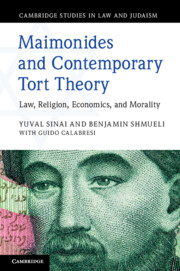Book contents
- Maimonides and Contemporary Tort Theory
- Cambridge Studies in Law and Judaism
- Maimonides and Contemporary Tort Theory
- Copyright page
- Contents
- Figures
- Introduction
- 1 Initial Presentation
- 2 Tort Liability in Maimonides’ Code:
- 3 The Foundations of the Maimonidean Theory:
- 4 The Deontological and Religious Elements of Maimonides’ Tort Theory
- 5 Consequentialist Considerations in the Guide for the Perplexed
- 6 Revisiting the Problematic Texts of the Code in Light of the Guide and Contemporary Scholarship
- 7 Maimonides’ Standard of Care:
- 8 Maimonides as a Pluralistic-Differential Scholar and Contemporary Tort Law Theories:
- 9 Reflections on Maimonides’ Tort Theory
- Index
1 - Initial Presentation
Published online by Cambridge University Press: 10 August 2020
- Maimonides and Contemporary Tort Theory
- Cambridge Studies in Law and Judaism
- Maimonides and Contemporary Tort Theory
- Copyright page
- Contents
- Figures
- Introduction
- 1 Initial Presentation
- 2 Tort Liability in Maimonides’ Code:
- 3 The Foundations of the Maimonidean Theory:
- 4 The Deontological and Religious Elements of Maimonides’ Tort Theory
- 5 Consequentialist Considerations in the Guide for the Perplexed
- 6 Revisiting the Problematic Texts of the Code in Light of the Guide and Contemporary Scholarship
- 7 Maimonides’ Standard of Care:
- 8 Maimonides as a Pluralistic-Differential Scholar and Contemporary Tort Law Theories:
- 9 Reflections on Maimonides’ Tort Theory
- Index
Summary
Chapter 1 is devoted to a brief description of the major milestones of contemporary and Jewish/talmudic torts. This description serves as an initial presentation of the place of torts in the private arena of law vis-à-vis other fields. We start with a presentation of Jewish law of torts in general and in Maimonides’ writings. There were attempts to base tort liability in the talmudic legal tradition solely on a fault-based liability theory of peshiah (negligence), but these attempts encountered difficulties. We further present the goals of torts according to contemporary tort theories. We introduce monistic vs. pluralistic approaches, those approaches that focus only on one goal (such as optimal deterrence, distributive justice, and corrective justice) as opposed to mixed-pluralistic approaches that integrate two or more goals. Next, we move on to deal with the standard of care and present the full range of tort liability regimes, starting from strict liability and ending in fault-based liability. We also present the book’s method. The interdisciplinary character of the book requires the use of various methods, such as those of comparative law, legal history, law and religion, Judaic studies, legal theory, and economic analysis of law.
Keywords
- Type
- Chapter
- Information
- Maimonides and Contemporary Tort TheoryLaw, Religion, Economics, and Morality, pp. 5 - 38Publisher: Cambridge University PressPrint publication year: 2020

